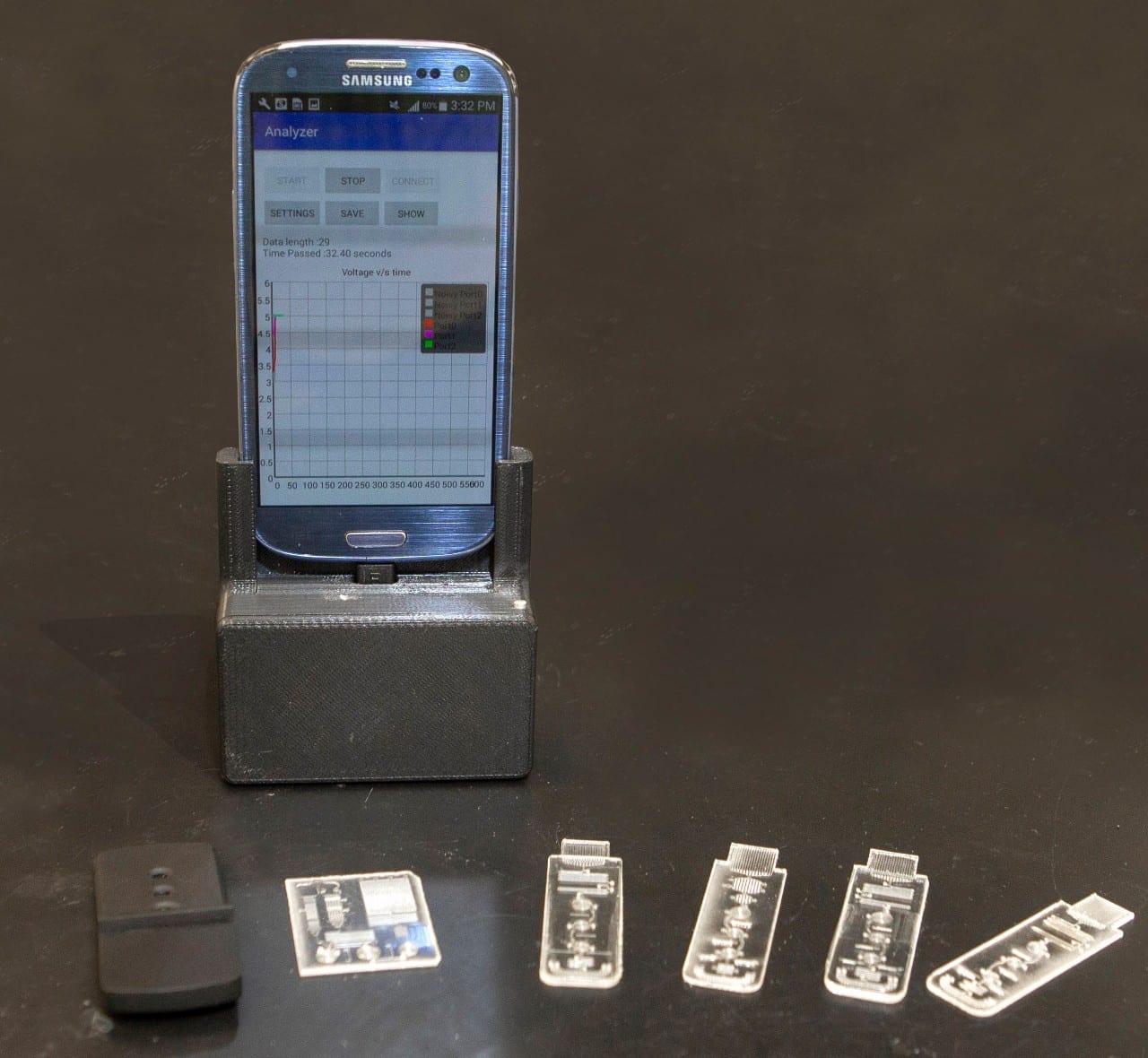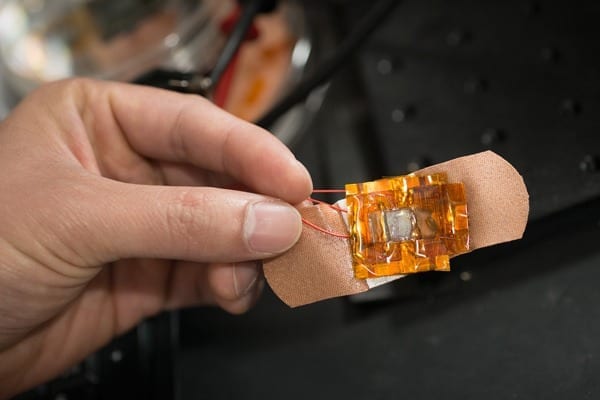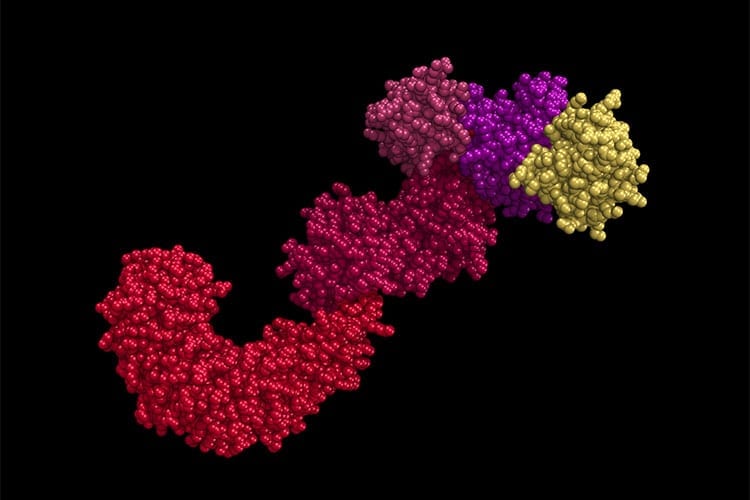Associate Professor Matthew Hill, Dr Mahdokht Shaibani and Professor Mainak Majumder with the lithium-sulphur battery design.
The mobile health tool plugs into your phone to diagnose illnesses such as coronavirus
Using your phone to diagnose disease or track your medical condition is the holy grail for remote health monitoring.
So far it’s been impractical to combine the two in a single device. Tech companies don’t want the regulatory headaches that would come from labeling phones medical devices.
But University of Cincinnati engineers have come up with the next best thing.
UC professor Chong Ahn designed a tiny portable lab device that plugs into a phone, connecting it automatically to a doctor’s office through a custom app UC developed. With a single drop of blood or saliva on a custom plastic lab chip UC designed, the device smaller than a credit card can diagnose infectious diseases such as coronavirus, malaria, HIV or Lyme disease or countless other health conditions like depression and anxiety.
The phone provides the power and test protocol to the lab chip. A patient simply puts a single-use plastic lab chip into his or her mouth then plugs that into a slot in the box to test the saliva.
The device automatically transmits results to the patient’s doctor through a custom app UC created for nearly instant results.
In his latest study, Ahn and his research team used the smartphone device to test for malaria. But the device could be used for smart point of care testing for countless chronic or infectious diseases or to measure hormones related to stress.
“Everybody has a phone – more than 3 billion people,” Ahn said. “So how can we use that technology to test for infectious diseases such as coronavirus? It’s a rapid diagnostic tool you can use at home. Right now it takes several hours or even days to diagnose in a lab, even when people are showing symptoms. The disease can spread.”
Ahn’s study on malaria was published in January in the Nature journal Microsystems & Nanoengineering.
The project demonstrates UC’s commitment to research as described in its strategic direction called Next Lives Here.
This is the future of personal healthcare.
Sthitodhi Ghosh,UC engineering student
Ahn is an electrical and biomedical engineering professor in UC’s College of Engineering and Applied Science. He directs two centers on campus, the Engineering Research Center Cleanroom and the Ohio Center for Microfluidic Innovation. UC honored him last year as a distinguished research professor.
His research team created a novel lab chip that uses natural capillary action, the tendency for a liquid to adhere to a surface, to draw a sample down two channels called a “microchannel capillary flow assay.” One channel mixes the sample with freeze-dried detection antibodies. The other contains a freeze-dried luminescent material to read the results when the split samples combine again on three sensors.
Ahn said the device is accurate, simple to use and inexpensive.
“The performance is comparable to laboratory tests. The cost is cheaper. And it’s user-friendly,” Ahn said. “We wanted to make it simple so anyone could use it without training or support.”
UC doctoral student Sthitodhi Ghosh, the study’s lead author, said the biggest advancement in the device is in the novel design of its tiny channels that naturally draw the sample through the sensor arrays using capillary flow. Ahn is Ghosh’s Ph.D. advisor.
“The innovation of this device is using a capillary-driven microfluidic lab chip,” Ghosh said. “So the entire test takes place on the chip automatically. You don’t have to do anything.
“This is the future of personal healthcare,” Ghosh said.
While the device has applications for diagnosing or monitoring viruses or other diseases, Ahn said he sees potential in the field of mental health. Mental health providers already use smartphones to track the wellness of patients through regular surveys. But psychosocial data can be subjective.
Ahn recalled the excruciating stomach ache he felt when he was hospitalized for an infection. He had trouble translating how he felt on a pain scale of 1 to 10 for his doctors. The pain left him feverish and soaked in sweat, but he reasoned it could surely be worse.
“I said, ‘I’m a 2’ so they didn’t give me pain medicine. My wife says, ‘Honey, you almost died! Take the pain medicine.’ So from then on I said I was a 6 or 7 and I got pain medicine and I was good,” he said.
By routinely testing hormones or other biomarkers associated with depression or anxiety, Ahn said he could help doctors correlate how patients feel with actual changes in their biochemistry. This could improve treatment for countless patients, he said.
And the device can use saliva as well as blood, which is less invasive and stress-inducing than a finger prick.
“If you’re stressed from doing a finger prick, it’s already creating a bias in the testing of stress,” Ghosh said. “That’s why we’re moving to a noninvasive method.”
Ahn is pursuing a patent to commercialize his device. Medical diagnostics company Mico Biomed, which has offices in Cincinnati, is a co-author of the study.
The biggest hurdle could be making people feel confident and comfortable enough to use the unfamiliar device at home, he said.
But the vast amounts of data collected from the tests over time could help psychiatrists better understand the biochemistry underlying mental illness, which could lead to better evidence-based treatments, he said.
“My dream for the rest of my career at UC is to improve public and mental health by providing a new mobile health tool,” he said.
The Latest Updates from Bing News & Google News
Go deeper with Bing News on:
Remote health monitoring
- DocGo discloses cyberattack after hackers steal patient health data
Mobile medical care firm DocGo confirmed it suffered a cyberattack after threat actors breached its systems and stole patient health data.
- CLOUD DX Signs Multi-Year Contract with Provincial Health Authority
This agreement is the 4th Provincial Health Authority contract for Cloud DX remote patient monitoring (RPM) services, alongside Alberta, the Yukon and Prince Edward Island. · After a successful ...
- Increasing Demand for Remote Patient Monitoring to Drive the Growth of the Tele-intensive Care Unit Market; says TN, The Niche Research
Global Tele-intensive Care Unit Market to Reach Valuation of US$ 22.4 Bn by 2034; Anticipated to Experience CAGR of 14.2% During 2024 – 2034Wilmington, Delaware, May 07, 2024 (GLOBE NEWSWIRE) -- The ...
- Study: Remote physiologic monitoring among Medicaid users skyrocketed from 2019 to 2021
Between 2019 and 2021, remote physiologic monitoring via wearables and mobile apps soared ... according to the report published Monday in Health Affairs. Usage varied by states, though, the authors ...
- Remote Patient Monitoring Market Poised for $8.5 Billion by 2031, Fueled by a Sturdy 16.3% CAGR
According to a recent report published by Allied Market Research, the global remote patient monitoring market experienced remarkable growth, garnering $1.9 billion in 2021. Projections indicate that ...
Go deeper with Google Headlines on:
Remote health monitoring
[google_news title=”” keyword=”remote health monitoring” num_posts=”5″ blurb_length=”0″ show_thumb=”left”]
Go deeper with Bing News on:
Diagnosing infectious diseases
- Diagnosis, prevention, and treatment of infectious diseases in children
In the realm of pediatric healthcare, managing infectious diseases represents a pivotal challenge, given the distinctive physiological responses and developmental considerations unique to children.
- RSV in Babies and Children: Symptoms, Causes, Diagnosis, Treatment, and Prevention
RSV (respiratory syncytial virus) is common and sometimes dangerous. Here’s how long RSV is contagious in babies and older kids, plus how to treat it.
- 5 Signs of Lyme Disease You Really Shouldn’t Ignore
Lyme disease is a very, very antibiotic-responsive condition. It has a bad reputation for being difficult to treat, but it’s never too late to treat it,” Anne Bass, MD, a rheumatologist at the ...
- Karius Raises $100M Co-Led by Khosla Ventures, 5AM Ventures and Gilde Healthcare, to Expand Access to Advanced Genomic Diagnostics in Infectious Disease, Addressing ...
Karius®, Inc., a world leader in genomic diagnostics for infectious disease, today announced it has secured $100 million in Series C funding. The roun ...
- Mpox outbreak that is rapidly spreading through Congo may be a new form of the disease
Scientists say a mutated form of mpox, detected in a mining town in Congo, might spread more easily among people than previous outbreaks.
Go deeper with Google Headlines on:
Diagnosing infectious diseases
[google_news title=”” keyword=”diagnosing infectious diseases” num_posts=”5″ blurb_length=”0″ show_thumb=”left”]











